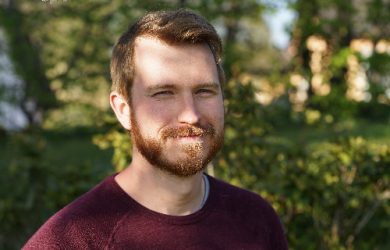Sean Lawrence (Ph.D., History)
 What struck Sean Lawrence while at the ruins of the ancient city of Göbekli Tepe in the Anatolia region of Turkey was not the archeological work that was under way but how the local shepherds and farmers had very little say in how this site was to be preserved.
What struck Sean Lawrence while at the ruins of the ancient city of Göbekli Tepe in the Anatolia region of Turkey was not the archeological work that was under way but how the local shepherds and farmers had very little say in how this site was to be preserved.
That observation led him on a four-year quest to study how multinational institutions and corporations often act without regard for the concerns of local people in underdeveloped regions. Along the way he not only taught himself German, French, Turkish, and Ottoman Turkish; won a prestigious Fulbright Scholar award; lived for a time in Turkey and Germany; and spent hours in windowless archives; but also completed his doctoral studies in history at UC Santa Cruz.
The cross-disciplinary conversations and experiences at UC Santa Cruz—including classes he took in history of consciousness, feminist studies, and environmental studies—were “an enormous benefit for my career and research,” said Lawrence, 33, who had wanted to combine humanism with ecological study.
Soon, he, his wife, and two children will move from their home in Bad Reichenhall, Bavaria, Germany, to the U.S., where Lawrence has been hired as an assistant professor at West Virginia University teaching 20th-century European history.
Lawrence’s Ph.D. work focused on the relationship between Germany’s Deutsche Bank and the Ottoman Empire, which ruled from the 13th century to the end of WWI. In the late 1800s, the Ottoman government wanted to build a railroad in the Anatolia region of Turkey but, according to Lawrence, it was short on cash. It managed to get a loan from Deutsche Bank, securing it with promises of income from taxes levied on things like fisheries, salt, and farmers’ crops in the region, he said.
The result was that the bank had an incentive not only to build the railroad but also to invest in side projects to increase the amount of taxes it garnered, specifically by building massive irrigation projects to boost agricultural output and thus revenue, Lawrence said.
Villages were flooded, malaria thrived, wheat and barley became major crops, and the landscape was irrevocably altered “by essentially convincing these groups that these [changes] were the keys to the riches of untapped agricultural potential,” Lawrence said.
Locals had little or no say in how this kind of salvage capitalism transformed their lives and land.
“A lot of things we think of as unique to our modern capitalistic world really have roots dating back much further,” Lawrence explained. “The relationship between Deutsche Bank and the Ottoman government was symbiotic. They reinforced each other at the expense of regular folks. It is the same form of domination that multinational firms apply to rural people today.”
Lawrence, meanwhile, already has a new research project in mind. Back in the U.S., he will be teaching and also looking at how changes brought on by business development in an area of Turkey have contributed to the rise of a serious, tick-borne disease that can cause hemorrhaging and even death.
Original link: https://news.ucsc.edu/2022/05/commencement-2022-lawrence-sean.html.
